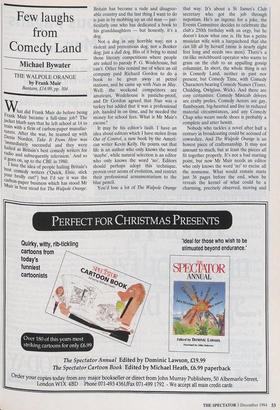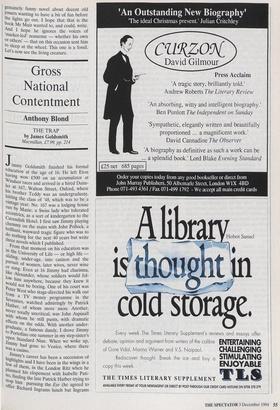Few laughs from Comedy Land
Michael Bywater THE WALPOLE ORANGE by Frank Muir Bantam, £14.99, pp. 304 by Frank Muir Bantam, £14.99, pp. 304 Oftlimanew What did Frank Muir do before being Frank Muir became a full-time job? The jacket blurb says that he left school at 14 to train with a firm of carbon-paper manufac- turers. After the war, he teamed up with D,. erlis Norden. Take It From Here was Immediately successful and they were hailed as Britain's best comedy writers for radio and subsequently television.' And so it goes on, up to the CBE in 1980. I love the idea of people hailing Britain's best comedy writers ('Quick, Elsie, stick Your brolly out!) but I'd say it was the carbon-paper business which has stood Mr Muir in best stead for The Walpole Orange. Britain has become a rude and disagree- able country and the last thing I want to do is join in by mobbing up an old man — par- ticularly one who has dedicated a book to his granddaughters — but honestly, it's a dog.
Not a dog in any horrible way; not a violent and pretentious dog, nor a Booker dog; just a dull dog. Bits of it bring to mind those literary competitions where people are asked to parody P. G. Wodehouse, but can't. Other bits remind me of when an oil company paid Richard Gordon to do a book to be given away at petrol stations, and he came up with Nuts in May. Well: the weekend competitors are amateurs, Wodehouse is pastiche-proof, and Dr Gordon agreed that Nuts was a turkey but added that it was a professional job, handed in on time, and he needed the money for school fees. What is Mr Muir's excuse?
It may be his editor's fault. I have an idea about editors which I have stolen from Out of Control, a new book by the Ameri- can writer Kevin Kelly. He points out that life is an author who only knows the word 'maybe', while natural selection is an editor who only knows the word 'no'. Editors should perhaps adopt this technique, proven over aeons of evolution, and restrict their professional armamentarium to the blue pencil.
You'd lose a lot of The Walpole Orange that way. It's about a St James's Club secretary who got the job through nepotism. He's an ingenu; for a joke, the Events Committee decides to celebrate the club's 250th birthday with an orgy, but he doesn't know what one is. He has a petite musician wife with a harpischord that she can lift all by herself (mine is nearly eight feet long and needs two men). There's a rat-like switchboard operator who wants to grass on the club to an appalling gossip columnist. In short, the whole thing is set in Comedy Land, neither in past nor present, but Comedy Time, with Comedy Characters bearing Comedy Names (Tozer, Chidding, Owlglass, Wick). And there are cosy certainties: Comedy Minicab drivers are crafty proles, Comedy Actors are gay, flamboyant, big-hearted and live in reduced material circumstances, and any Comedy Chap who wears suede shoes is probably a complete and utter hewitt.
Nobody who tackles a novel after half a century in broadcasting could be accused of cowardice. And The Walpole Orange is an honest piece of craftsmanship. It may not amount to much, but at least the pieces all fit together properly. It's not a bad starting point, but now Mr Muir needs an editor who only knows the word `no' to excise all the nonsense. What would remain starts just 36 pages before the end, when he reveals the kernel of what could be a charming, precisely observed, moving and genuinely funny novel about decent old tossers wanting to have a bit of fun before the lights go out. I hope that that is the book Mr Muir wanted to, and could, write. And I hope he ignores the voices of market-led' nonsense — whether his own or others' — that on this occasion sent him to sleep at the wheel. This one is a fossil. Let's now see the living creature.











































































 Previous page
Previous page